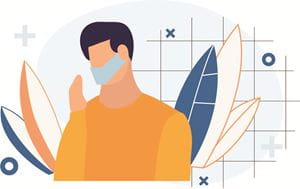
As doses of the first COVID-19 vaccine authorized for use are being given around the world, health experts are reassuring the public about the safety of the vaccine and sharing possible side effects. Possible side effects include allergic reactions, based on reports from the UK that detailed a small number of trial participants having this response. Two additional reports from the US have reported allergic reactions in health care workers receiving the vaccine. However, allergist Dr. Shahzad Mustafa says that allergic reactions to vaccines are an extremely rare occurrence.
“The probability for an allergic reaction to the COVID-19 vaccine is very low, likely and similar to the risk with other vaccines. Although allergic reactions can occur, they’re incredibly rare events.” says Dr. Mustafa.
According to the American College of Allergy, Asthma, and Immunology, the chance of an allergic reaction to a vaccine is approximately one in a million.
A common belief is that past reactions increase the risk of future reactions, with each reaction increasing in severity. Dr. Mustafa says this is a common myth that is simply not true.
“Every allergic episode is an individual event. One reaction does not affect future reactions, and should not contribute towards concern about receiving the COVID-19 vaccine,” he said.
Even if an individual has experienced a previous allergic reaction (to a food, pollen, medication, stinging insect), this does not increase their risk of having an allergic reaction to the COVID-19 vaccine.
Although highly unlikely, allergic reactions can occur, and that is why vaccines, including the COVID-19 vaccine, should be administered in a healthcare setting capable or recognizing and treating allergic reactions.
According to the CDC, people who have experienced severe reactions to prior vaccines or injectable drugs can still receive the Pfizer/BioNTech COVID-19 vaccine. The only individuals who should not receive the COVID-19 vaccine are those with a known allergy to one of the components of the COVID-19 vaccine.
If you’re worried that you might face an allergic reaction to the COVID-19 vaccine, or if you have a history of severe allergic reactions, talk to your primary care physician.
“Allergists have skin testing protocols to test for vaccine allergies,” explains Dr. Mustafa. “Even if individuals have a history of allergic reactions to a specific vaccine, we can typically safely administer the vaccine using a graded dosing protocol.”
It’s important to avoid confusing expected side effects with allergic reactions to a vaccine. Minor side effects are normal and expected for a few days around vaccination, and can include:
Signs of an allergic reaction typically start within minutes to two hours of vaccination, and include: